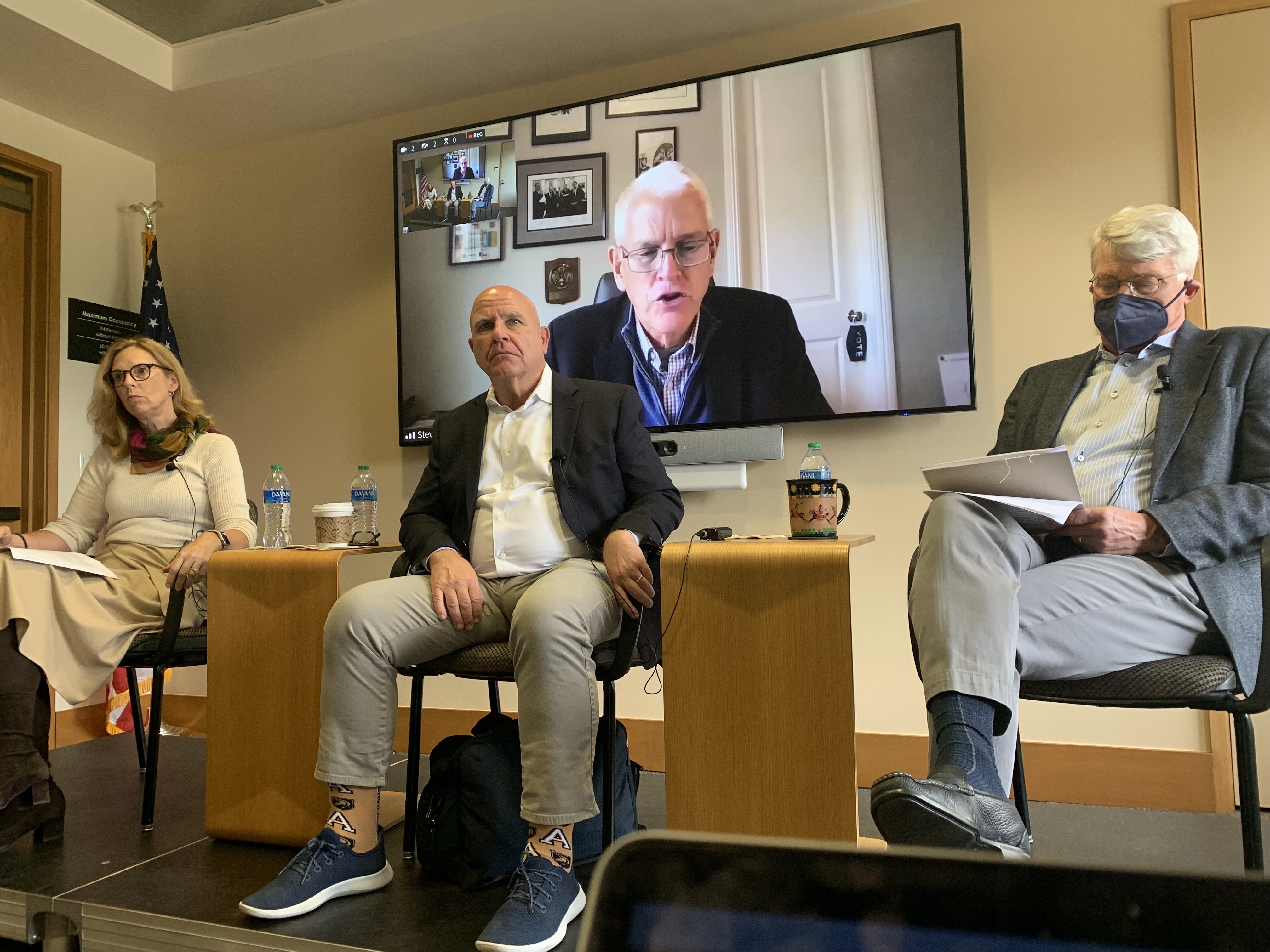Students, alumni and professors celebrated the importance of voting and reflected on the role of American democracy in global affairs at the Democracy Day International Luncheon this Tuesday.
Stanford has observed Democracy Day since 2021. The third-annual event canceled classes for the day in an effort to increase student voter turnout. The international luncheon, catered by Coupa Cafe, facilitated conversations on the significance of voting and encouraged students to participate in the electoral process.
Invitees in attendance included Larry Diamond, James Fearon, Anna Gryzmala-Busse, Hesham Sallam, Didi Kuo and Kharis Templeman. Kathryn Stoner, who is the Mosbacher Director of the Center on Democracy, Development and the Rule of Law (CDDRL), moderated the event.
Diamond, a senior fellow at the Freeman Spogli Institute (FSI), said during the panel that his experience and age gave him a distinct perspective on voting. As an 18-year-old in 1969, he was not allowed to vote until the 26th amendment — which lowered the voting age to 18 — was passed in July 1971.
Fearon, a political science professor, first voted in the 1980 election.
“The reason you should vote is that it’s a gigantic collective action problem and you have a duty to do that,” Fearon said. “If people think, ‘Oh an election won’t be decided by one vote,’ then all the people who share your views and follow that logic means that the whole system degrades. There would be no participation.”
Kuo, the associate research director for CDDRL, noted that past elections have been decided by a few votes. She recalled waiting for the disputed results of Bush v. Gore in 2000, in which the Supreme Court intervened in Bush’s favor. She said she was 17 at the time, so she was unable to vote.
Gryzmala-Busse, a senior fellow of FSI, immigrated to the United States from Poland and offered an international lens to American voting. She first voted at 22 years old because she wasn’t a citizen until then.
“For the first time, I really felt that I was part of this democracy. There was an emotional aspect to it,” Gryzmala-Busse said.
Panelists also discussed the impact of the terrorist attack in New York on Sept. 11, 2001. Stoner, who is originally from Canada, was living in New Jersey at the time and said the attack encouraged her to pursue dual citizenship.
“We lost neighbors and friends in our community just outside New York City and I thought, well, I have children in the school system. I pay taxes here. It’s irresponsible not to go ahead and get dual citizenship,” Stoner said.
Stoner and her brother, a physicist at MIT, both took the U.S. citizenship oath and first voted in an American election in 2003.
Sallam, a senior research scholar at CDDRL, also remembered voting after 9/11. He specifically recalled the PATRIOT Act and how some viewed its surveillance as a transgression. The act allowed the government to monitor internet traffic and allow potential tapping of mobile devices.
9/11 “was very painful, and question marks were being raised about the issue of civil liberties here in the United States,” Sallam said.
The issue of civil liberties extends beyond the United States, various panelists said as they brought up examples of rising authoritarianism around the world, including India, Turkey and Venezuela.
“I worry about global democracy in part because of China and Russia, especially China taking on and seeming interested in an expansive anti-democratic program,” Fearon said.
Diamond said the threat of anti-democratic programs is current and pointed to the 2023 election in Turkey as an example. He said current Turkish president Recep Tayyip Erdoğan would have lost the race to Ekrem İmamoğlu, the mayor of Istanbul, if Erdoğan hadn’t disqualified him from running.
“That virus of authoritarian populism, the threat is by no means over. It’s very live, and it’s very, very dangerous,” Diamond said.
Templeman, a research fellow at the Hoover Institution who specializes in Taiwan, sees Taiwan as a reason for optimism despite the threats of the Chinese Communist Party and said “Taiwan has defied the democratic recession.”
The panel also looked toward the future of American democracy, with special regard to the 2024 presidential election.
“It’s appropriate to start thinking of how that election will affect global politics,” Stoner said. The panelists agreed that the impact of U.S. foreign policy will be key to developments in Israel, Ukraine and Taiwan.
The panel concluded with speakers highlighting the importance of civic engagement. Stoner joked that “everyday is Democracy Day” for the panelists.
